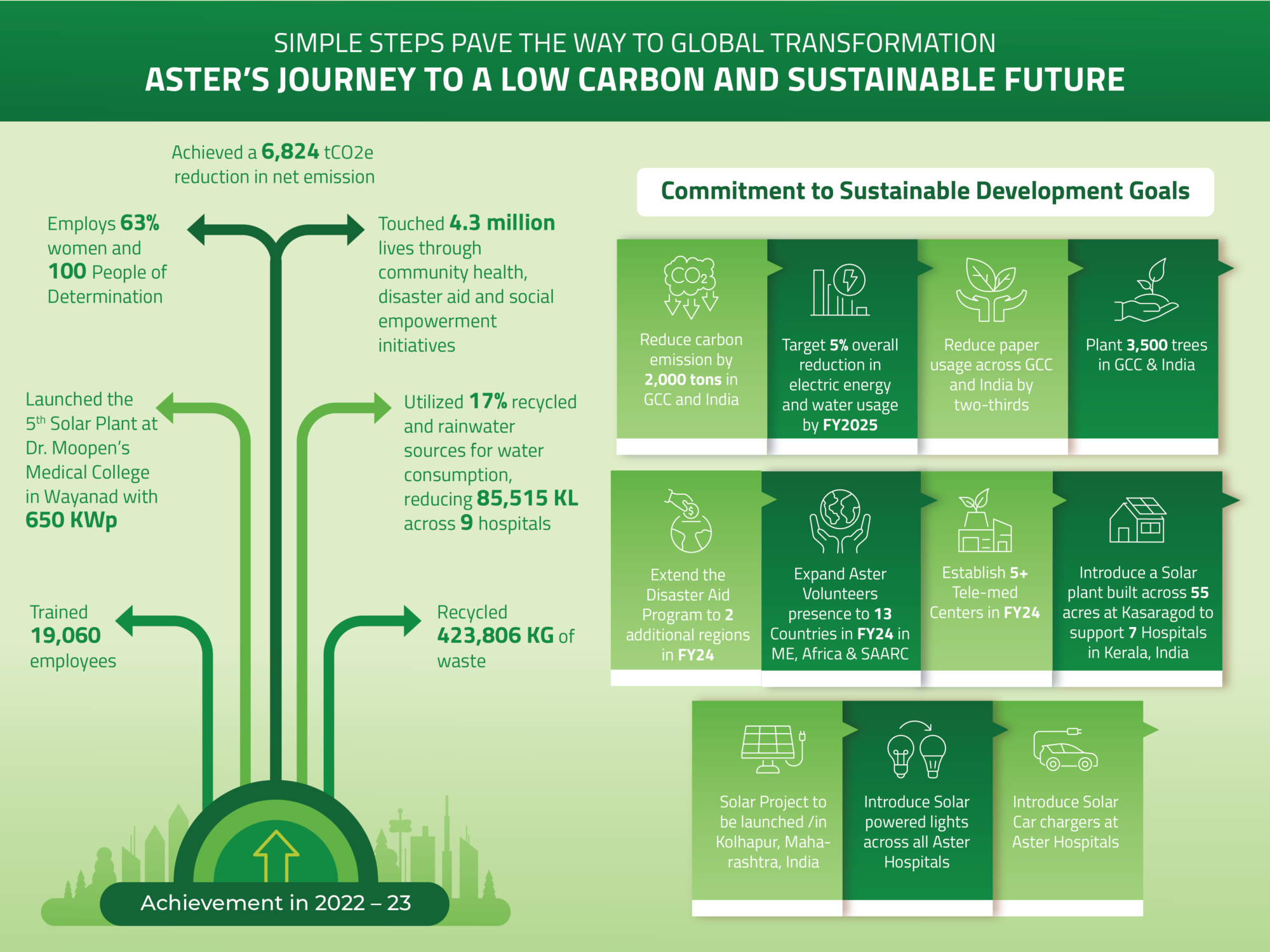Aster achieves reduction of 6,824 tCO2e in net emissions in FY23, announces 3-year ESG commitments
Aster DM Healthcare, a leading integrated healthcare provider in GCC and India, has released its annual ESG Report, demonstrating an unwavering commitment to environmental sustainability, ambitious targets, and a proven record of positive impact. The

Aster DM Healthcare, a leading integrated healthcare provider in GCC and India, has released its annual ESG Report, demonstrating an unwavering commitment to environmental sustainability, ambitious targets, and a proven record of positive impact. The company aligns its ESG practice with 10 key United Nations Sustainable Development Goals (UNSDGs), emphasizing its dedication to global objectives.
In pursuit of a greener tomorrow, Aster has strategically integrated renewable energy sources, along with optimizing water utilization, waste management and sustainable transport management practices into its day to day operations. With integration of renewable energy sources including 3,679,200 KWh solar energy, 2,300,000 KWh wind energy, and 3,569,298 KWh hydro energy, the company achieved a noteworthy reduction of 6,824 tCO2e reduction in net greenhouse gas emissions, despite significant operational expansion. Decarbonization initiatives continued across 5 hospitals, with a new solar plant of 650 kWp commissioned at Aster Wayanad Specialty Hospital – poised to reduce 460 tCO2e per annum.

Water conservation efforts have seen a 17% reduction in consumption across operations, with 85,515 KL water savings achieved through innovative practices, including recycling and rainwater harvesting. Aster’s commitment to responsible waste management has resulted in the recycling of 423,806 KG of waste, emphasizing the organization’s holistic approach to sustainability.
Commenting on the ESG practice, Dr Azad Moopen, Founder Chairman, Aster DM Healthcare said, “At Aster, our commitment to ESG principles is woven into the fabric of our corporate culture. We actively integrate sustainable practices across every vertical of our operations, recognizing that our dedication to environmental, social and governance considerations is a fundamental ethos guiding our journey towards a more sustainable and responsible future. Notably, we hold the highest ESG ranking among listed healthcare companies in India, earning a ‘Strong’ rating from CRISIL, alongside multiple awards and recognition from different industry bodies in GCC. Looking ahead, we remain committed to further elevate our ESG standards by targeting a low carbon and sustainable future. We envision setting new benchmarks for environmental stewardship and social impact. Our goal is not just to meet current standards but to continuously raise the bar for excellence in ESG performance.”
Beyond operations, Aster’s corporate social initiatives, including the Aster Volunteers program, impacted 4 million+ lives through healthcare outreach to the underprivileged in the past year. Initiatives such as planting 2,000+ saplings, aiding 10,000 beneficiaries through programs like Aid for Assam and building 250 homes for victims of the Kerala Floods, reflect Aster’s role as a catalyst for positive change. Governance practices at Aster DM Healthcare align robustly with sustainability goals, ensuring ethical and responsible conduct.
Looking ahead, Aster remains committed to advancing its environmental agenda through the launch of a 3-year plan. The organization has placed emphasis on climate change mitigation with a targeted reduction of 2,000 tons of carbon emissions in GCC and India. It also aims to reduce paper usage by two-thirds across the GCC and India, accompanied by the ambitious goal of planting 3,500 trees in these regions. Aster also plans to build a large-scale solar plant spread across 55 acres in Kasargod which would power seven hospitals in Kerala, India.
By 2025, the organisation plans to reduce overall electricity consumption by 5% throughout GCC and India, contributing to a more sustainable energy profile. In tandem, a parallel commitment to a 5% overall reduction in water usage across these regions by FY2025 underscores dedication to responsible and efficient water management practices. Measures like solar powered lights across Aster Hospitals, solar car charging stations are set to be introduced.
The Aid Program will expand disaster support to two additional regions in FY24, complementing the four regions in FY23. Simultaneously, plans include establishing five Tele-Med Centres in the same fiscal year. Aster Volunteers Mobile Medical Services will see an expansion from 32 to 41 units in FY24, covering diverse regions. Volunteer engagement targets an 18% increase in registered Aster Volunteers in FY24, with external partnerships playing a pivotal role in achieving these objectives.

These initiatives collectively underscore Aster DM Healthcare’s comprehensive approach to environmental and social stewardship, affirming its commitment to building a more sustainable and resilient future.






